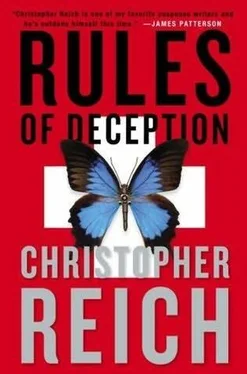“Mind if I use your phone?”
“All yours.”
Von Daniken placed a call to a contact in the identity documents department of the Belgian Federal Police. “Frank, I have one of your passports on my desk. Belongs to a man who got himself killed last night. If I didn’t know better, I’d say it’s the real thing.” He read off the number and the corresponding name.
“It’s genuine,” said Frank Vincent after a second or two. “Number’s in the system.”
“Funny. We have the man down as Theo Lammers, a Dutch citizen. Do me a favor: run a complete check on this Jules Gaye. Go all the way back. Tell me if he’s real, or if he’s a straw man.”
“I’ll need some time. End of the day suit you?”
“Before lunch would be better. And one more thing: tell me where you mailed the passport.”
Von Daniken hung up. Max Seiler was examining the New Zealand passport. Again, it passed muster. The document had not been doctored and its number did not turn up on any of their databases for stolen papers. Von Daniken checked his watch. It was five-thirty p. m. in Auckland. Past closing time. He decided to contact the embassy in Paris, instead. Due to the ten-hour time difference, the Kiwis maintained a beefed-up embassy in France capable of handling most official inquiries.
Von Daniken placed the call and was informed that the passport was authentic. According to the New Zealand authorities, the passport holder, Michael Carrington of 24 Victoria Lane, Christchurch, was a citizen in good standing. Officially, NRA. Nothing recorded against. He requested a review of the issuing documents and was told an inquiry would be made forthwith.
“What do you make of it?” he asked after he’d hung up.
Seiler shrugged. “Two valid passports with your victim’s picture, and differing names. There’s only one answer, isn’t there? Gaye and Carrington are legends. We can rule out a dirty businessman. Looks like you’ve got an illegal on your hands.”
An “illegal” was a trained government agent operating clandestinely on foreign soil without his country’s protection. A deep-cover spy.
Von Daniken nodded. Unsettled, he returned to his office. It had been seven years since anything remotely resembling this case had come across his desk. He had just two questions: Who was Lammers working for? And what had he been doing in Switzerland that had gotten him killed?
It was only at seven a.m. that the port turbine engine belonging to the Gulfstream IV was finally repaired and the jet made ready for takeoff from Bern-Belp airport. Despite Marcus von Daniken’s offer of lodging, Philip Palumbo had remained on board, choosing to sleep on a couch at the rear of the passenger compartment.
As the jet pushed back from the terminal, Palumbo left his seat and ducked through the aft hatch that led to the luggage compartment. The cargo area was a tight space with a sloping ceiling, absent windows. Three suitcases were stacked in one corner. Pushing them aside, he kneeled and slid back a panel in the floor that concealed a sturdy stainless steel handle. Giving a yank, he pulled a section of floor clear to reveal a seven-foot by four-foot compartment kitted out with a mattress and belt restraints.
Lying inside the compartment was a slim, olive-skinned man dressed in a white jumpsuit, his hands and feet bound by flexi-cuffs and connected by a perp chain. His beard had been shaved. His black hair cut to a soldier’s regulation length. The diaper he wore was also regulation. All were measures designed to depersonalize the prisoner and make him feel powerless and vulnerable.
He looked like a young man. With his wire-rimmed glasses he might have been a university student or a computer programmer. His name was Walid Gassan. He was thirty-one years of age, an avowed terrorist linked at one time or another to Islamic Jihad, Hezbollah, and like every self-respecting Islamic fanatic, Al-Qaeda.
Palumbo hauled the prisoner to his feet and guided him into the passenger compartment, where he pushed him into a seat and attached the seat belt tight around his waist. He spent a moment daubing Mercurochrome on Gassan’s ruined fingers. He’d given up three fingernails before Palumbo had quit.
“Where are you taking me?” asked Gassan.
Palumbo didn’t answer. Leaning down, he unlocked the man’s foot restraints and spent a moment massaging the prisoner’s calves to keep his circulation active. He didn’t want Gassan to drop dead of deep vein thrombosis before they squeezed some information out of him.
“I am an American citizen,” Gassan went on defiantly. “I have rights. Where are you taking me? I demand to be told.”
There was a maxim that had sprung up about extraordinary rendition. If the CIA wanted to question someone, they sent him to Jordan. If they wanted to torture him, they sent him to Syria. If they wanted him to disappear off the face of the earth, they sent him to Egypt.
“Think of it as a surprise, Haji.”
“My name isn’t Haji!”
“You’re right,” said Palumbo with menace. “You know what? You don’t have a name. As far as the world is concerned, you no longer exist.” He snapped his fingers an inch from the prisoner’s nose. “You just disappeared into thin air.”
Palumbo buckled himself in as the jet lifted into the air. A screen at the head of the cabin showed the plane’s progress on a world map, along with updates about its speed, the outside temperature, and time to destination. After a few minutes heading north, the Gulfstream banked to the left until its nose pointed south by southeast. Toward the Mediterranean Sea.
“I’ll give you one more chance,” said Palumbo. “Talk now or later. I can promise you that the first option is the one you want to take.”
Gassan’s timid brown eyes darted toward him. “I have nothing to say.”
Palumbo sighed, shaking his head. Another hardcase. “What about the explosives you picked up in Germany? Let’s start there.”
“I don’t know what you’re talking about.”
“Of course you don’t.”
He looked at Gassan, imagining the terrible things that the young man had done, the deaths he had caused, the families he had torn. And then he thought about what the man would face when they landed.
In four hours’ time, Mr. Walid Gassan would get his due.
A knock came at the door.
“Moment, bitte.” Jonathan pulled a worn Basque sweater over his T-shirt and slipped into a pair of moccasins as he walked to the door. “Yes?”
The hotel manager stood in the hallway. “On behalf of all the staff, may I offer our heartfelt condolences,” he said. “If there is anything I or any member of my staff can do…”
“Thank you,” said Jonathan. “But I’m alright for the moment.”
The manager nodded, but did not leave. Instead, he drew a buff envelope out of his jacket and extended it toward Jonathan. “Some mail. For your wife.”
Jonathan took the envelope and held it under the light. It was addressed to “Emma Ransom, Hotel Bellevue, Poststrasse, Arosa.” The script was large, bold, and meticulous. A man’s hand, he thought automatically. He turned the letter over. There was no name or return address.
“A day late, I’m afraid,” explained the hotelier. “The crew enlarging the railway tunnel near St. Peter-Molinas brought down an avalanche on the tracks. I explained it all to Mrs. Ransom. She was quite upset. I must apologize.”
“You talked to Emma about this?”
“Yes. Saturday evening before dinner.”
“So she was expecting this letter?”
“She whispered something about a birthday. She made me promise to hold it for her.”
Читать дальше












